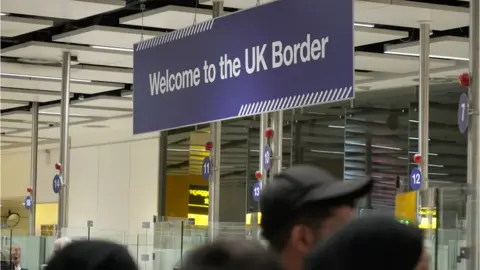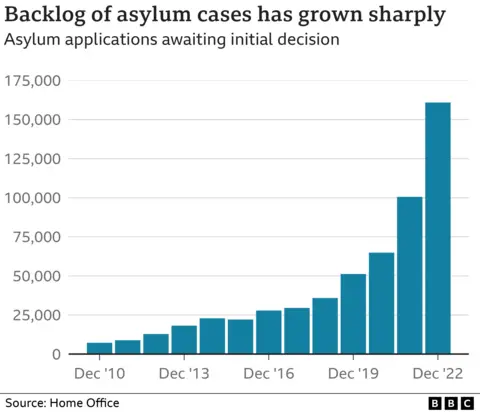Asylum claims for 12,000 to be considered without face-to-face interview
 BBC
BBCSome 12,000 asylum seekers to the UK are to be considered for refugee status without face-to-face interviews.
A 10-page Home Office questionnaire will decide the cases of people from Afghanistan, Eritrea, Libya, Syria and Yemen who applied before last July.
The move aims to reduce the asylum backlog which Prime Minister Rishi Sunak has pledged to end this year.
The Home Office says this is not an asylum amnesty - but it will streamline the system for five nationalities.
Applicants from these countries already have 95% of their asylum claims accepted, says the Home Office.
The usual security and criminal checks will still be conducted and biometrics taken, but, for the first time, there will be no face-to-face interviews, say officials.
Instead, eligible asylum seekers must fill out a form and answer up to 40 questions.
The questionnaire must be completed in English and returned within 20 working days, or the Home Office may consider the asylum application has been withdrawn.
However, officials say there will be a follow-up notification if no reply is received, and every application will be considered on its own merits.
The British Red Cross warned that the 20-day limit could have "devastating" impacts on people who need protection, may not speak English and are likely traumatised from fleeing persecution and war.
Asylum backlog
Having previously stressed the importance of in-person interviews, the Home Office is likely to face criticism that the fast-tracking has more to do with the prime minister's promise to cut the asylum backlog, than having rigorous checks for identifying individuals with no right to be in the UK.
Last month, an asylum seeker from Afghanistan was sentenced to life imprisonment for killing a young man outside a Bournemouth takeaway.
It emerged that, before coming to the UK, Lawangeen Abdulrahimzai had been convicted of murder in Serbia and was a fugitive.
The Home Office says all individuals involved in the new process will be checked against criminal databases, and will be subject to security vetting.
The number of asylum seekers waiting for a decision on their case in the UK has soared to record levels - with around 166,000 people in the backlog.
Data published on Thursday show the number of asylum claims in the UK was almost 75,000 in 2022, the highest number for 19 years.
Almost 110,000 people have been waiting for longer than six months for a decision on their case.
More than three-quarters of asylum decisions made in 2022 were in favour of granting asylum - the highest number for more than 30 years.
In December, Mr Sunak pledged to halve the number of people who had been waiting longer than six months for an initial decision on their asylum application. More than 92,000 people have been identified in that group.

But Downing Street's determination to sort out the asylum backlog appears to mean making it simpler for thousands of migrants, some of whom will have arrived in small boats, to get permission to stay in the UK.
The policy may be uncomfortable for Home Secretary Suella Braverman, who portrays herself as tough on those who claim asylum having arrived by an irregular route.
A record 45,756 people successfully reached the UK in small boats last year.
In an interview with GB News on Wednesday, Ms Braverman said: "It's clear that we have an unsustainable situation in towns and cities around our country whereby, because of the overwhelming numbers of people arriving here illegally and our legal duties to accommodate them, we are now having to house them in hotels."
The Home Office intends to double the number of asylum caseworkers this year to help deal with record numbers waiting for a ruling on their request for sanctuary in the UK.
The Refugee Council and the British Red Cross have previously urged the government to introduce an accelerated process for asylum seekers from countries with high acceptance rates. Last year, they recommended 40,000 cases from Afghanistan, Eritrea, Syria, Sudan and Iran should be in this category.
The exclusion of Sudanese and Iranian asylum seekers from the list of people offered the Home Office's streamlined process is because the grant rates for those nationalities is slightly lower, although still about 80%.
Speaking to BBC Breakfast, Labour leader Sir Keir Starmer said the asylum system was "broken".
Sir Keir said many of the people arriving in the UK were brought by "criminal gangs who are making money out of human misery", adding that Labour would establish a specialist unit within the National Crime Agency to deal with the issue.
Shadow home secretary Yvette Cooper said: "It's damning that the Home Office isn't doing this already, given Labour has been calling for the fast-tracking of cases - including for safe countries like Albania - for months and the UNHCR recommended it two years ago.
"Meanwhile, the asylum backlog has skyrocketed - up by 50% since Rishi Sunak promised to clear it."
She added a Labour government would get return agreements in place so unsuccessful asylum seekers could be safely returned and take stronger action against gangs responsible for dangerous small boat crossings.
